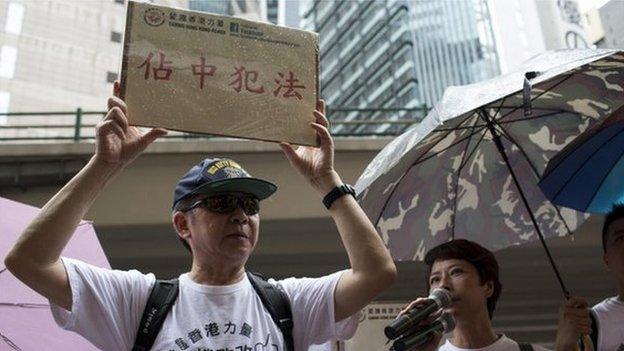Hong Kong's elections explained in five insults
- Published
Rival groups have come up with colourful ways of referring to one another, as the BBC's Helier Cheung explains.
Hong Kongers have a reputation for being outspoken and can boast an impressive array of creative insults.
So it's no surprise that the run-up to its controversial legislative council elections has seen an explosion of taunts and jibes.
The BBC explains what is at stake in these polls, which are being watched closely by Beijing - with the help of a few rude words.

1. 'Rubbish Council'

The word rubbish also sounds like legislative in Cantonese so obviously....
The 4 September vote, external is for the Legislative Council (LegCo), the body that passes and rejects laws, and approves the government's budget.
But not everyone takes it seriously.
Some call it "Rubbish Council" (punning on how the words "legislative" and "rubbish" sound similar in Cantonese), arguing the legislators are all talk and no action.
One reason the council is mocked is because it isn't exactly representative - only 40 out of its 70 seats are directly elected by voters.
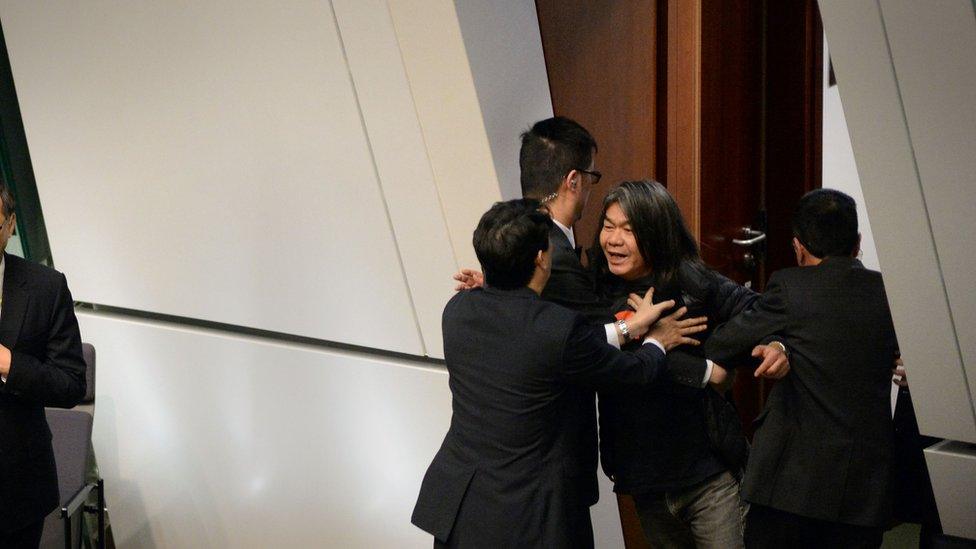
Legislator Leung Kwok-hung, nicknamed "Long Hair", has been removed from the council several times for interrupting - and once threw fruit at the chief executive
The other 30 seats are chosen by various business and professional groups.
This means that, despite Hong Kong having more than 3.7 million voters, more than 40% seats are determined by a pool of just 239,724 people.
Supporters of the system say this helps avoid populism and protects Hong Kong's business interests - but critics call it undemocratic.
The other reason people criticise LegCo is because many opposition legislators will filibuster - sometimes for long periods, external - to try and block government proposals.
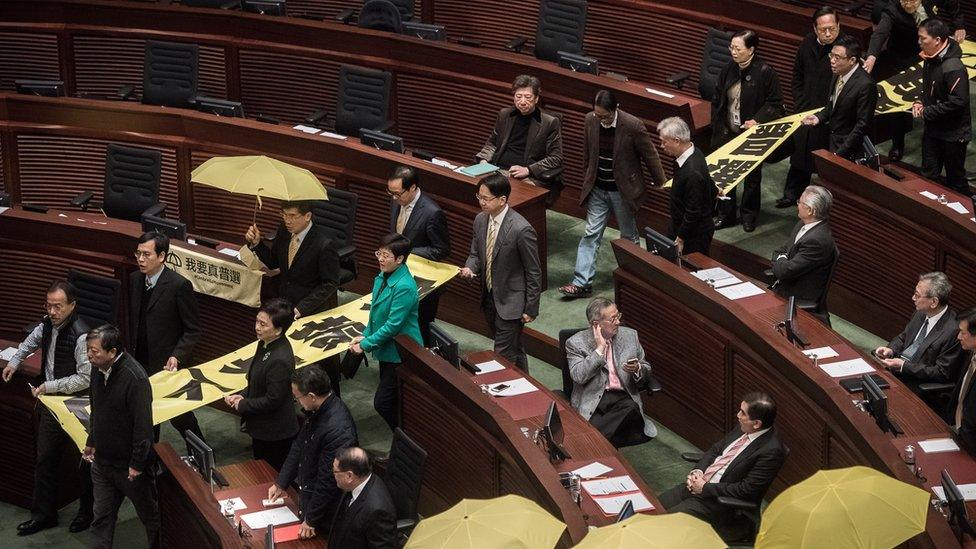
Pro-democracy lawmakers have used LegCo to protest: Here, they hold signs asking the Chief Executive to stand down, and calling for "real democracy"
They argue this is one of the few tools they have to hold the government to account - but critics accuse them of wasting time and money.
2. 'Traitors', 'Leftards' and 'Hot Dogs'
Support for political parties used to be split between pro-Beijing groups, and pro-democracy groups.
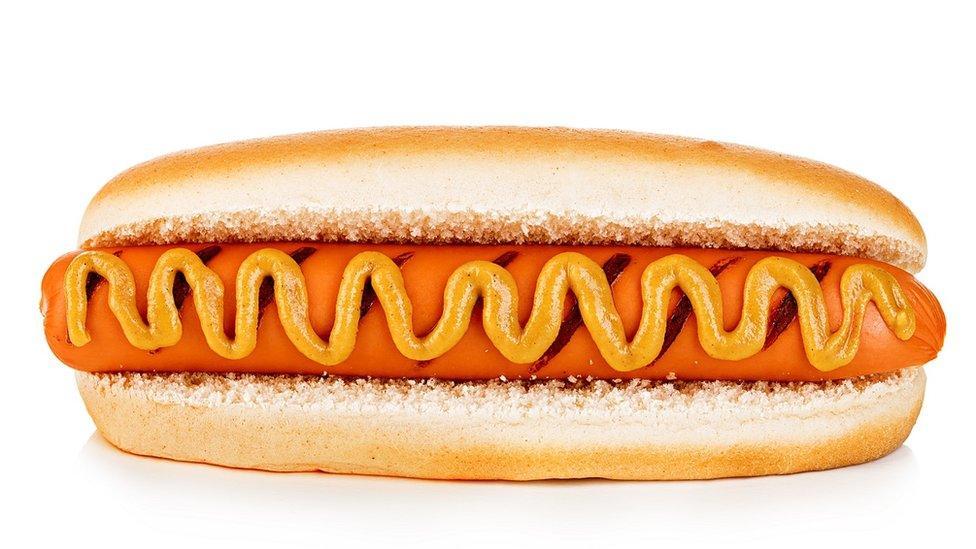
This is actually an insult in Hong Kong politics
The pro-Beijing side thinks good relations with China are more important than democratic reform, while democracy activists want universal suffrage - and aren't afraid of antagonising Beijing.
The groups don't exactly get along.
One popular slogan derides the main pro-Beijing party, the DAB, as being "the most shameless". Meanwhile, pro-democracy parties have been called "traitors to China" and "lackeys of the US" by people supporting Beijing.
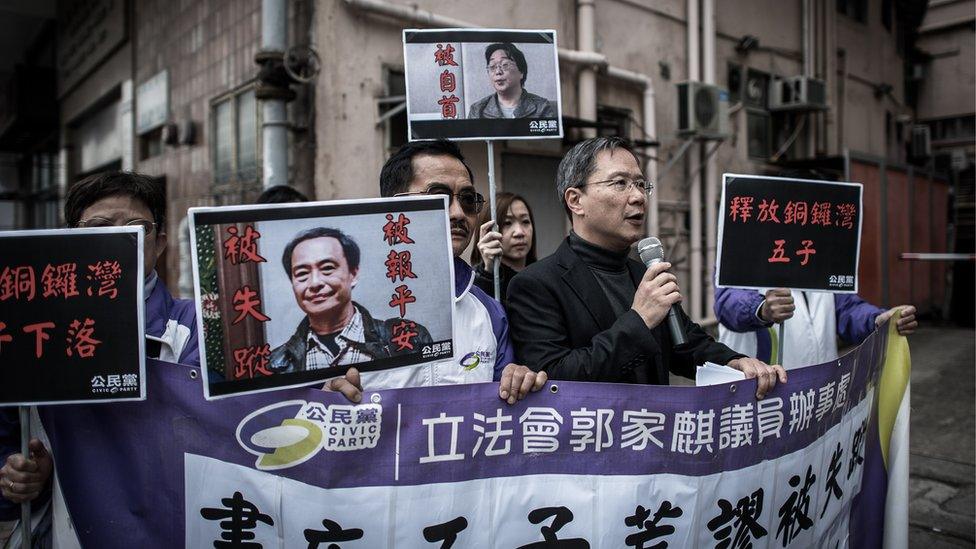
Pro-democracy parties have challenged the Chinese government on issues such as the missing Hong Kong booksellers
And the range of insults has grown in the last few years.
Many young democracy activists are frustrated at the lack of progress. Some have founded new political parties - ranging from youth-led pro-democracy parties to "localist" groups that are more confrontational.
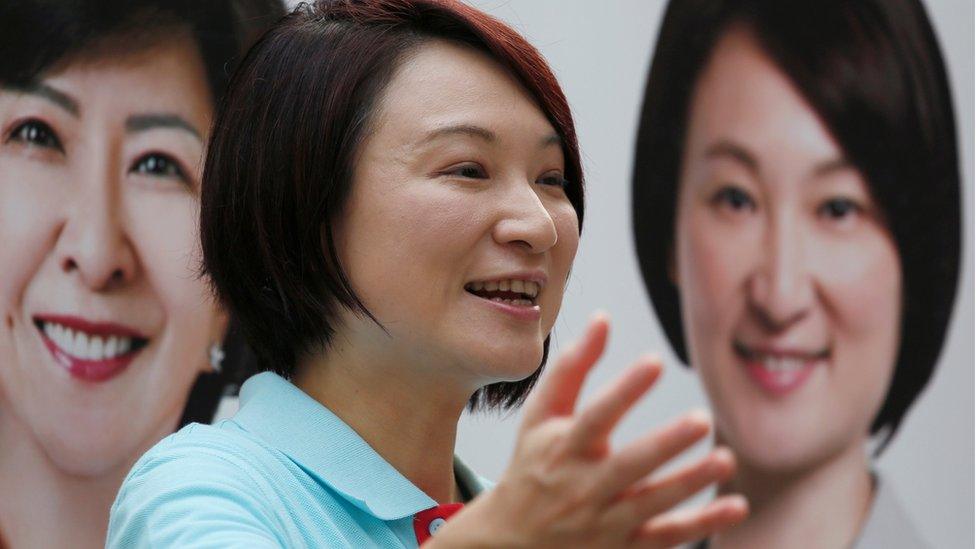
Pro-Beijing groups argue that economic development and good relations with China are the priority
Localist supporters have derided pro-democracy parties as "Leftards" - people who are liberal but useless at protecting local interests.
But they themselves attract plenty of insults. "Hot dogs" is the insult used to describe members of the Civic Passion group - meaning hot headed people who claim credit for everything, without doing the hard work needed for change.
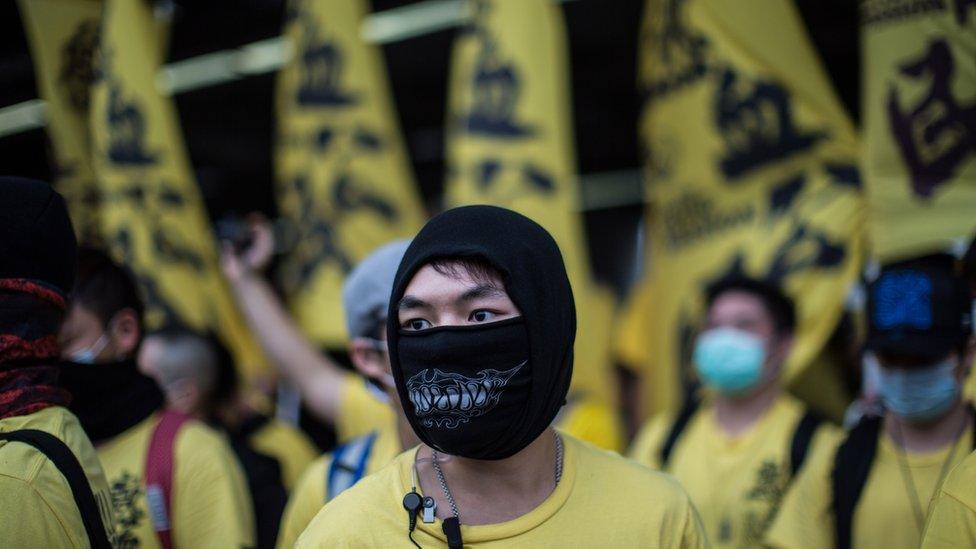
Localist groups feel China is eroding Hong Kong's freedoms and way of life
Analysts say the pro-democracy vote could get split between localist groups and traditional pro-democracy parties - and this could potentially lead to more wins for pro-Beijing groups.
3. 'Wolf', '689' and 'ABC'
The most talked-about man isn't even in the race.

This Ikea stuffed toy wolf became an unlikely protest symbol a few years ago after people used it to refer to CY Leung
Hong Kong's chief executive, CY Leung, is unpopular - he had an approval rate of just 19% in one survey, external.
He was elected by a committee of just 1,200 people - and even then, he only got 689 votes, leading to the nickname "689". Others call him a "wolf", accusing him of being untrustworthy.
Mr Leung matters in this election because LegCo's 70 members are part of the committee that votes for the chief executive.
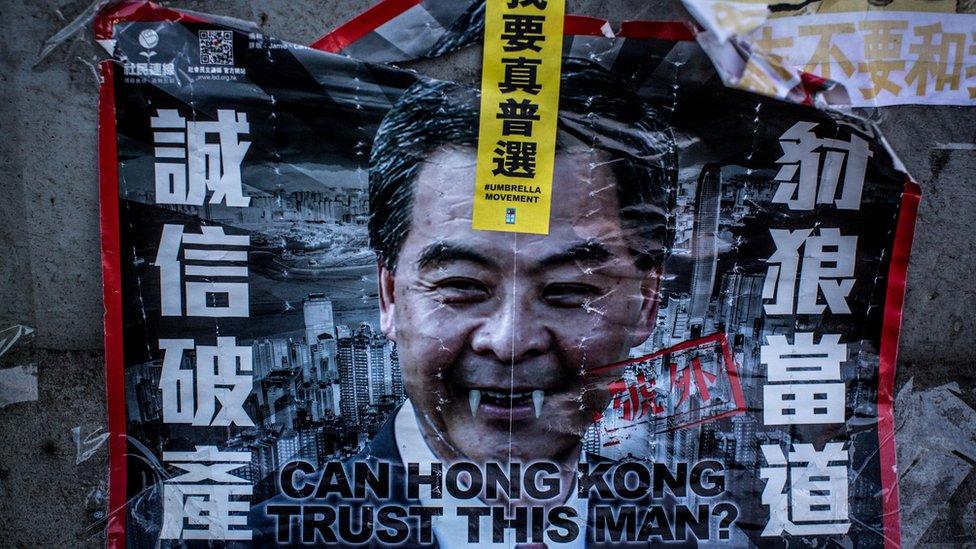
CY Leung is deeply disliked by some
As a result, lots of people are asking candidates whether they'd support another term of CY Leung.
Many political parties say they believe in ABC - "anyone but CY".
And it's put pro-Beijing parties in an awkward position. They've traditionally supported the Hong Kong and Beijing governments - but not all of them want to say they'd support Mr Leung when he's so unpopular.
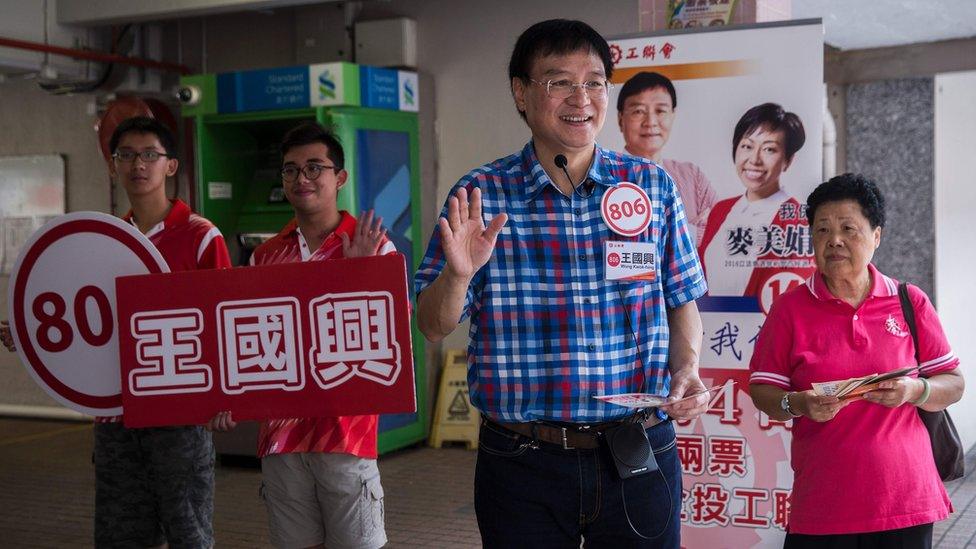
Pro-Beijing parties have traditionally supported both the Hong Kong and Chinese governments
4. 'Attention-seeking extremists'
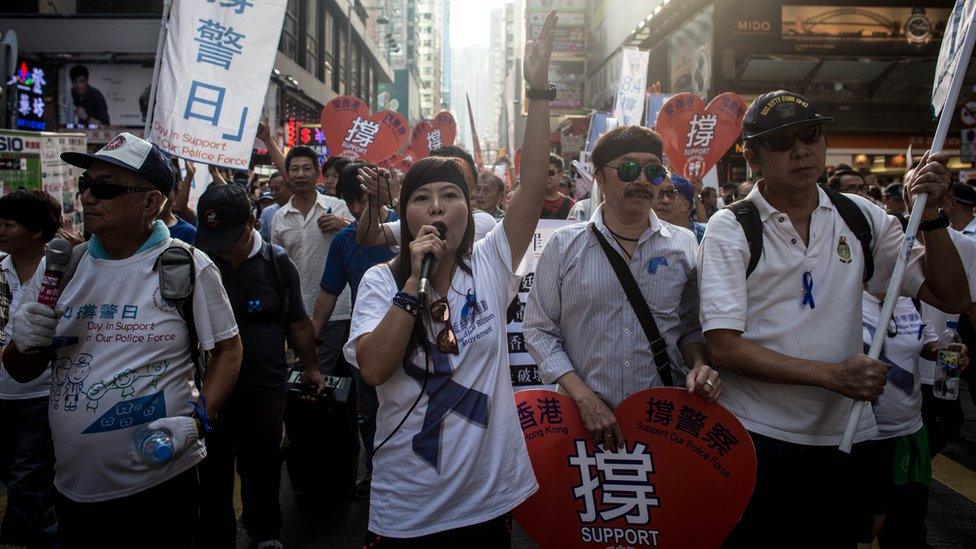
Pro-government groups have taken to the streets to express support for the police
The most sensitive word in this election is "independence". Some localist parties say Hong Kong should aim for independence from China.
The Chinese government hates the idea and state newspaper Global Times derides them, external as "attention-seeking extremists".
Still, these groups have tapped into the discontent felt by many young Hong Kongers.
Why do some Hong Kongers want independence?
Ahead of the polls, the government suddenly asked all candidates to sign a declaration form that said they agreed Hong Kong was "an inalienable part of China".
Six candidates were then disqualified over questions about whether they supported independence, sparking an outcry and allegations of political screening.
Earlier, some parties, external complained that brochures with terms such as "self-determination" were not approved for distribution by the electoral commission - though some were approved after the terms were replaced with satirical symbols such as stars and planets.
5. 'Hong Kong pig'
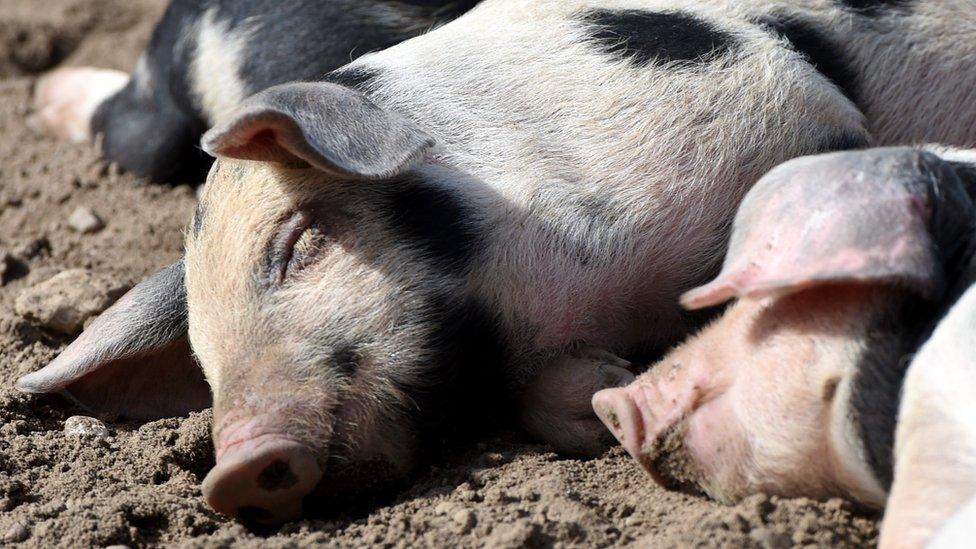
Not a care in the world? Perhaps you're a "Hong Kong pig"
Some would say any insult is better than this one. "Hong Kong pig" refers to people who don't care about politics at all, and only eat and sleep.
For those who eat, sleep, and care about politics, 24 is the key number to watch.
Major constitutional changes, including changes to the voting system, need to be passed by a two-thirds majority in the council. Pro-Beijing parties generally win more seats but the democrat lobby have always tried to win at least 24 seats so they can veto changes they disagree with.
Apart from the language, are the elections clean?
Hong Kong has a good anti-corruption record with a public sector ranked 18th out of 168, external by Transparency International.
But when it comes to politics, both sides have made - and denied - allegations.
The Chinese government has said some pro-democracy campaigners are backed by "foreign forces", while some news reports, external appeared to show people being paid to attend pro-government rallies.
Either way the public goes to the ballot box on Sunday knowing all the insults and hopefully knowing who gets their vote.
Additional reporting by BBC Chinese's Grace Tsoi.
- Published3 September 2016
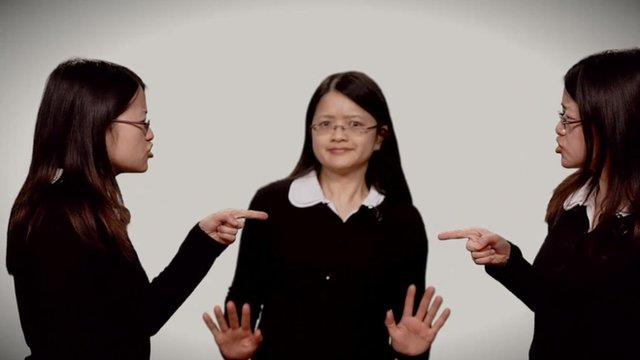
- Published29 August 2016
- Published11 February 2016
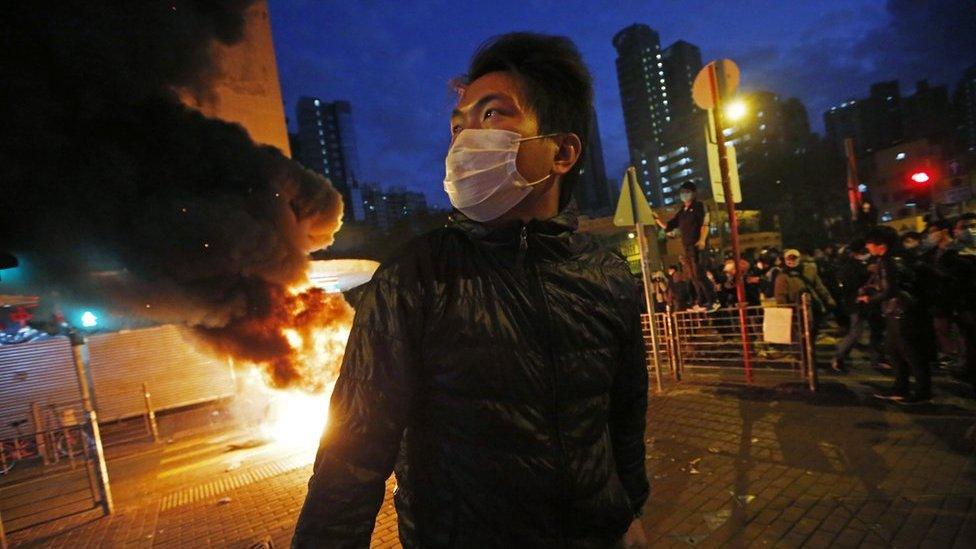
- Published18 June 2015
